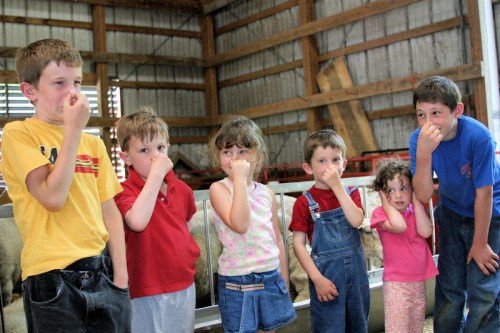
When I first picked up Hudson River Valley Farms: The People and the Pride behind the Produce
by Joanne Michaels, I thought it was a typical self-promoting regional book, meant to be sold at gift shops throughout its depicted geography. But I discovered within the farm profiles a commentary on agriculture in New York State.
Geography Lesson
Before I explain, let’s start with a brief geography lesson for those of you unfamiliar with New York state. Loosely speaking, the Hudson River Valley connects New York City in the south with Albany in the north. The book starts at the southern end of this valley and follows the Hudson River north, profiling many of the farms located in this valley. A map is included, allowing you to locate each farm and its relationship to the others and to the two major New York cities.
The Challenges of a Modern Farm in a Changing World
I thought I’d use quotes from various farmers to illustrate some of the themes the book presents to the careful reader.
…if it weren’t for the New York State agricultural exemption, the family farm couldn’t exist.
Kathy Longyear, Longyear Farm.
The closer one gets to New York City, the more land costs and the higher the real estate taxes. Without a tax exemption, many farms in the Hudson Valley wouldn’t be able to pay their taxes. Farmers closest to NYC inherited their land and repurposed it, changing the focus to take advantage of what city dwellers would pay most for. There is a constant struggle to hold onto the land when you can make more by selling it than working it.
Agri-tourism is the last refuge of agriculture.
Steve Osborne, Stoutridge Vineyard
Not everyone has the personality to have a public farm.
Thomas Hahn, Hahn Farm
Another way many farms increase their profit margin is to invite the public in–and charge them for it. Some offer you-pick opportunities, others provide tours, hay rides, mazes, community supported agriculture, classes, or a restaurant. One enterprising orchard operates a Lease-a-Tree program. These non-traditional activities have their own challenges, everything from liability issues and creative marketing to the need to smile when you don’t feel like smiling.
Diversity keeps us going, but breaks our backs.
Chris Cashen, The Farm at Miller’s Crossing
I think you need to be possessed to farm, you have to have a calling.
Maria Mikkelsen, Willow Tree Flower Farm.
One Ulster County farmer leaves at 2:30am to get to his NYC market. Another gets up at 3am to spray his trees, if that’s when they need it. On many farms, one or both partners has an outside job to supplement the farm’s income. Farming is more than physically demanding; it challenges the farmer mentally, emotionally, and financially as well. In every farm profiled, you can see the attention to detail and innovative thinking that enables these farms to survive when so many others have not.
Both Tour Guide and Documentary
The primary function of Hudson River Valley Farms is to entice you to visit these farms, and it does that admirably. The photography is wonderful, and directions to all farms, plus the markets they sell at, are provided, as well as the map mentioned previously. If you live or travel to the Hudson Valley region, you will want to consult this book for the opportunity it provides to obtain local food carefully grown. But this book also provides a glimpse into the challenges and concerns of farmers trying to make a living in the face of encroaching development, rising energy costs, and increasingly stringent regulations. If these kinds of agricultural issues interest you, this book merits a place on your reading stack, even if your armchair is far from the Hudson River.
Thanks to Rich Pomerantz, photographer for Hudson River Valley Farms, for providing the review copy.





Interesting review Kathy – thanks for the insight – I’ll probably read it now. It’s a subject of interest to us as we are looking at a couple different agricultural enter[rises as retirement income. I like the concept of providing entertainment being a part of it – it is what our society is about to an increasing degree. But entertainment can inform, educate and bring deeper understanding at the same time and those usually bring a level of respect to the relationship that just stopping by to buy a couple pounds of tomatoes might not.
.-= Donalyn´s last blog ..Baking with my sister =-.
Thank you – we need more books like these that help understand how some of the locals live and earn a living.
I’ve seen this book and been curious. As much as the farm stay idea seemed strange to me at first (and really hard on the small farmer), I think there’s a lot to Rich’s point that it’s bringing the public in contact with where their food comes from (the farm stay moreso than the maize maze), and may be helping gain local buyers’ loyalty over time. I hope so.
.-= Lynn´s last blog ..in Muir Woods =-.
From farmstays.blogspot.com:
“Kathy Purdy of the Cold Climate Gardening Blog recently wrote a book review of Hudson River Valley Farms: The People and the Pride behind the Produce, by Joanne Michaels. The book looks lovely, and seems like it provides some interesting commentary from farmers about agritourism. Take this quote, for instance, from Steve Osborne of Stoutridge Vineyard: “Agri-tourism is the last refuge of agriculture.” I hope to check out the book soon myself.”
This is a great review and illustrates the problems family farmers face in our country. I keep hoping this will change, and if we buy locally, maybe it will.~~Dee
.-= Dee/reddirtramblings´s last blog ..Muse Day, December: Common Cold, by Ogden Nash =-.
Apropos of the reviewer’s observations about the farmers in the book, one of the farmers I met when photographing for the book said to me that he is no longer just in the farming business, but finds himself now in the entertainment business, due to the continued need to create attractions to bring people to the farm for family fun activities which he then uses as selling and educational opportunities. I repeated this sentiment to many of the farmers I met during this project and they all agreed whole-heartedly. From berry-picking to corn mazes to a weekend brunch to CSA programs, what I realized was that there is a necessary added dimension to local agriculture which most people would not necessarily recognize as required for farming. I see this as a positive thing, despite the extra burden it places on the farmers, because what it means is that in order to succeed the smaller, family run farm must maintain a focus on the relationship with their customers, where large agribusiness is just the opposite.
The problems with the farms you describe in New York are common to farms all over the US, including here in Maryland. One of the most important ways that people can support local farms is to buy and eat local food, but also to continue to ask retailers for local foods. The demand will drive the supply, helping the farmers and providing us with a more secure, diverse and economically and environmentally sustainable food supply.
(Stepping off my soap box now.)
Robin
.-= Robin Ripley´s last blog ..Horseradish Harvest: My New Condiment Garden =-.
I say we do whatever we can to support independent farmers. It’s great that someone has written a book about the ones Hudson River Valley. Farming is a hard way to make a living, but oh so important.
.-= Mr. McGregor’s Daughter´s last blog ..When a Gardener Hosts a Party =-.